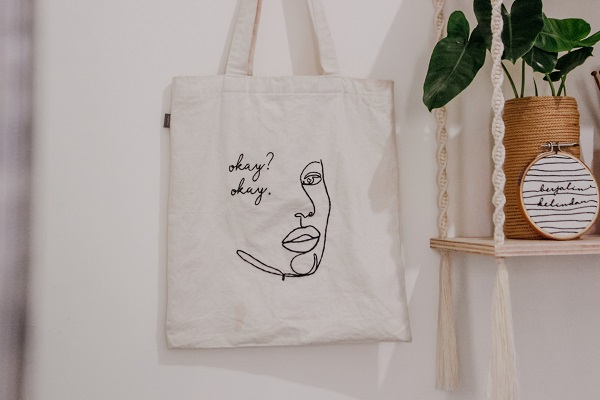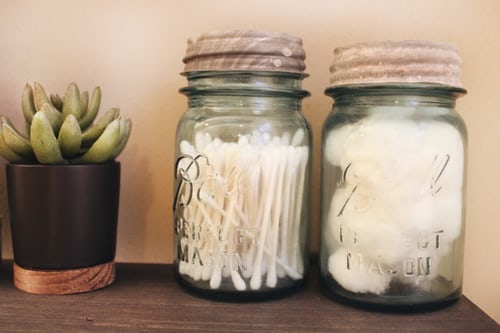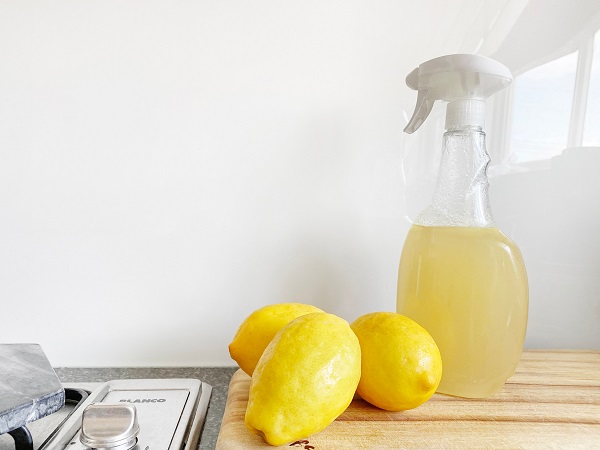As professional declutterers and organisers, we often work in homes and workplaces that are generating a large amount to waste. We also often see clients who fastidiously recycle their plastic, glass and cardboard etc. But at the same time, the act of recycling is taking up a lot of their time – it’s actually adding to their overwhelm and sometimes they even make a purchase in order to makes themselves feel better about that bad feeling.
It’s important to address the way we consume goods, change our mindset and our relationship with belongings. By making these changes, or taking steps to, we can create a more sustainable home and will be more likely to stick to changes too.
These tips can help you achieve a simplified home and life as well as a more sustainable one.
Compost
Composting food can be a way to sustainably process waste and contribute to a more sustainable home. It provides nutrients for plant life and diverts waste away from landfill, thus saving CO2 emissions.
Did you know that the following can be composted?
- fruits
- vegetables
- dairy products, including eggshells
- leaves
- grass clippings
- grains and bread
- unbleached paper napkins
- dry cat or dog food
- manure
- coffee filters
- meat
- newspaper
If you would like to get started, here is a simple guide to composting from RHS.
Use reusable products i.e. fabric tote bags
There are so many ways to reuse items over and over again and avoid buying new. However, doing so can take a certain amount of organisation. If you need to cement the habit of using fabric tote bags for shopping, try making space for a basket in which to keep them. Or hang them from a hook on a wall. If you can have a permanent home for these bags in a place where you can quickly grab them on your way out, you will be more likely to remember to take them with you. You could also keep a stock in your car if you drive.
Re-purpose
Re-purposing differs from upcycling (see below) because it tends not to involve changing the item. Instead, the item simply changes it’s original use because it can be usefully positioned elsewhere. Sometimes, the re-purposed use can be even better than the original. This is a sustainable concept because by re-purposing, you are preventing waste and potentially avoiding buying something new.
Examples of re-purposing:
- Wooden crates can make excellent storage boxes for garages, lofts, cellars and sheds, as well as many other places. You could use them to store blankets, shoes, pet supplies, toys or books.
- Used wellies or walking boots can be plant pots.
- Tyres can be cleaned and used as large planters.
- Glass jars can make excellent storage for small items such as hair bobbles, cotton balls and jewellery
- Tupperware that is surplus to requirements or is discoloured can be used to store small children’s toys, craft items or make up.
- Glass bottles can be candlestick holders.
- Bulldog clips are excellent for re-sealing food packaging.
It is important, when re-purposing, to be realistic about whether you will use these items in a different way. At times, we see a lot of items build up in homes when people have had the best of intentions to re-purpose them, but haven’t got around to it. As long as you’re realistic and have a specific idea in mind, this can work beautifully.
Upcycle
If you can upcycle something you already own, you’ll extend the life of the item and can potentially turn something that was previously clutter into a valued or useful belonging.
You might simply update the look of something, such as painting an old piece of furniture, or you could create something new entirely, for example an old piano becoming a bookshelf. Breathing a new lease of life into well used items, can be extremely rewarding.
Examples of upcycling:
- Empty food tins can be covered and decorated to make pen pots.
- Old picture frames and mirrors can be decorated, painted and made into serving trays, white boards or cork boards.
- Old door frames, cupboard or cabinet doors can be made into coffee tables.
- We have seen old suitcases beautifully upcycled into side tables, medicine cabinets or storage boxes.
- Varnishing and painting furniture is a simple way to upcycle it, completely change it’s look and style and create something unique. Try painting them bright colours or use masking tape to create zig zags or other designs.
Upcycling in itself can be a rewarding hobby and it can be a valuable pastime to carry out with someone else. It’s also potentially a way to create a really special and unique belonging that can be treasured for years to come.
Create a ‘green’ cleaning kit
The ultimate green cleaning caddy could made from a sustainable material such as wood. Lemon makes a good disinfectant and stain remover. Vinegar cuts through grease. Baking soda and bicarbonate are also brilliant cleaners and astringents. You can also re-purpose socks and underwear as cleaning clothes and reuse empty spray bottles or containers. One of the best things about a sustainable cleaning kit is that it will encourage you to use less products. You don’t need an abundance of choice or a wide variety of bottles in order to clean your home.
Donate unwanted items
One of the most rewarding parts of decluttering is donating items that can be used by others. Donating means that these items are not being wasted or going into landfill. Even if the material they are made of is recyclable, recycling still uses energy so passing items on is far preferable. As well as supporting your local charity shops, below are some ideas donating more specialist things:
- Donate Tools to Tools For Self Reliance, who provide tools to countries such as Ghana and Malawi to support people to build sustainable livelihoods.
- Donate second hand books to Better World Books, which generates funds for literacy and education initiatives.
- Donate used electronics to The Air Ambulance Service. They will pick up items and remove sensitive information from your devices.
- Donate Hair to The Little Princess Trust and by doing so you can help children and young people suffering with hair loss.
Become a intentional consumer
It’s easy to acquire things we don’t need. Reasons for this include: ordering easily online with a few clicks of a button, items seeming like bargains or a solution to make our lives easier, things being sold in bulk or comparing what we have to others. However, it’s also easy to fill our homes with too may belongings for the storage space or these things can remain unused and become clutter. Buying less reduces the amount of waste you produce and reduces demand for the manufacture of physical things, which take energy to make. You can still support the economy by buying more experiences over physical things.
Aside from helping you live a sustainable life, here are some other ways that experiences can be more valuable than things:
- Most material belongings do not last for your lifetime – experiences however can – memories can remain with you and stories can be passed down to future generations indefinitely.
- Experiences can be shared with others and can foster human connection.
- When you have an experience, it can change and shape you as a person – contributing to growth and personal development.
- Anticipation of an experience can be even better than the experience itself.
- Getting used to living with less belongings means a simpler life and a sustainable home that is easier to clean and a potentially more relaxing place to be.
You may also want to check out our related article: 5 Ways To Organise Waste In Your New Home





